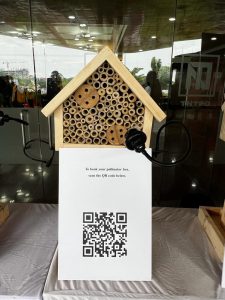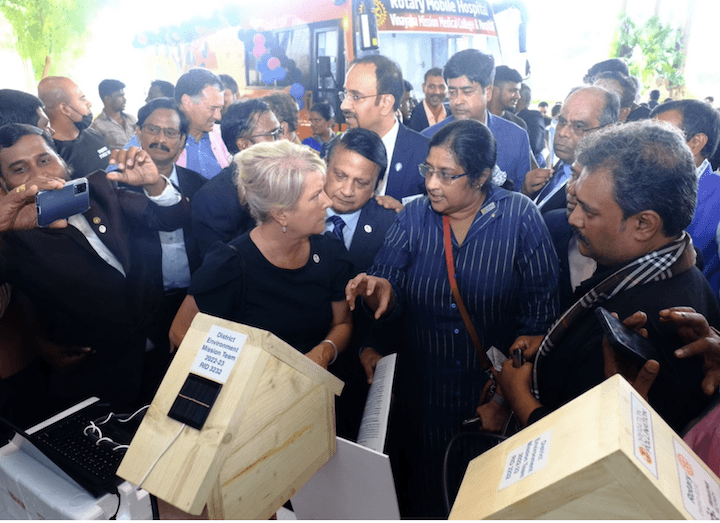By Dr. Mina Venkatamaran
ESRAG South Asia has started collaborating with the environmental NGO ATREE (atree.org) on their citizen science program to increase the numbers of urban pollinators by establishing bee hotels. To our delight, this brought our pollinator project face-to-face with Rotary International President Jennifer Jones when she attended a town hall meeting in District 3232 on July 26, 2022. Her enthusiastic response inspired RID A. S. Venkatesh, currently RI Treasurer, to call the District Governor, Rtn Nandakumar, the next day to suggest that he double the scale of our project.
Pollination – an essential ecosystem service – is imperiled by the loss of insect populations due to the use of pesticides and other anthropogenic activities. Studies in Europe have shown the decline in pollinator populations is affecting crop yield. We have reached a point where hand pollination, which used to be a pastime for kitchen gardeners, has become a paid job in vegetable farms across India in the quest to increase yield. But bees are doing extremely well in urban areas with multiple garden sources.
The majority of the solitary bees roost in small cavities. ATREE consulted with Rotarians in Rotary District 3291 on how to design bee hotels and get data sent to them. We decided to expand this program to D 3232, and proposed a memorandum of understanding between the Districts and ATREE in which Rotarians would help document the kinds and numbers of pollinators in our city.
ESRAG’s South Asia Chapter Chair Arun Vaddi and I commissioned five boxes – the “bee hotels” – and got them ready to go. A wildlife filmmaker, Saravanakumar, suggested adding a motion camera so Rotarians who miss the entry of an insect into the hotel could still record the species. Currently we are using an app provided by the motion camera to upload our observations.
We set up this project as part of the Operation Pollination pledge to be undertaken by the clubs. Our plan was for the District Governor to sign the resolution in the presence of RIP Jennifer Jones when she visited Chennai.
By the time Jennifer Jones reached our exhibit at the town hall meeting, she was being mobbed. She got excited seeing our bee hotels and started taking photographs. We barely got to talk to her for 30 seconds, but told her how open pollination in fields now is the need of the hour, and how the silent pollinators in our cities are now the last resort, providing 90% of the pollination in our fields. In this photo I’m explaining the fundamentals of the project to her.
Why a bee hotel? As you can see from the picture, a bee hotel has different-sized bole holes made of bamboo. It helps pollinators like carpenter and mason bees that lay eggs in cavities. There are still other bees that lay eggs in the soil.

Are bee hotels the solution to increase pollinators? It is certainly a way to bring awareness to people about how this essential service to the human food supply is carried out by these unseen insects. We are using this as a conversational tool to discover pollinator corridors. Rotarians with bee hotels get interested by looking for pollinators. They just need to maintain the boxes. The camera helps in keeping them engaged to see variety of visitors using the structure and makes them more amenable to creating pollinator-friendly spaces. Bee hotels are a great way to stimulate interest and conversations about how to protect these vital insects.
Is the box going to solve pollination issues? Not particularly, but it is a good way to intrigue the community and engage them in supporting pollinators.
Photo credit: D 3232. In photo: RIP Jennifer Jones, Mina Venkatamaran, South Asia Chapter chair Arun Vaddi.

